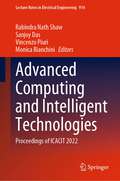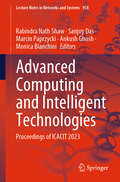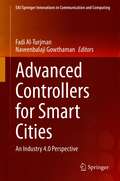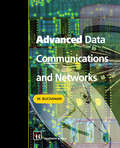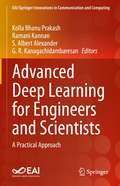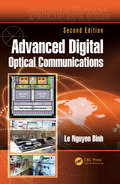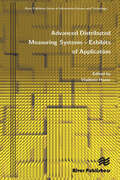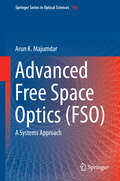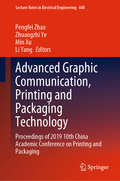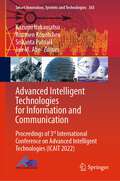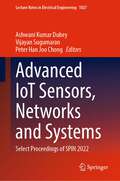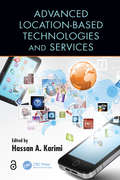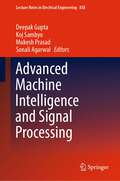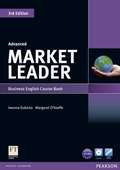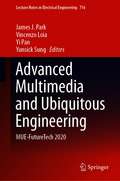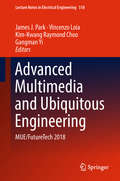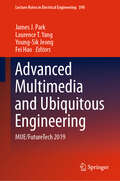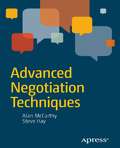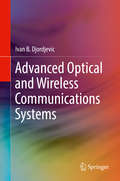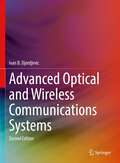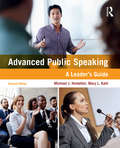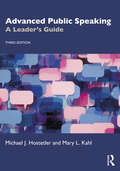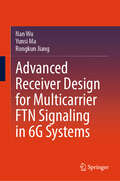- Table View
- List View
Advanced Computing and Intelligent Technologies: Proceedings of ICACIT 2022 (Lecture Notes in Electrical Engineering #914)
by Vincenzo Piuri Monica Bianchini Rabindra Nath Shaw Sanjoy DasThis book gathers selected high-quality research papers presented at International Conference on Advanced Computing and Intelligent Technologies (ICACIT 2022), held at BIHER Chennai India, during March 12–13, 2022, jointly organized by Institute of Higher Education and Research Chennai 600073, Indira Gandhi National Tribal University, Regional Campus Manipur, India, and Department of Information Engineering and Mathematics Università Di Siena, Italy. It discusses emerging topics pertaining to advanced computing, intelligent technologies and networks including AI and machine learning, data mining, big data analytics, high performance computing network performance analysis, Internet of things networks, wireless sensor networks, and others. The book offers a valuable asset for researchers from both academia and industries involved in advanced studies.
Advanced Computing and Intelligent Technologies: Proceedings of ICACIT 2023 (Lecture Notes in Networks and Systems #958)
by Marcin Paprzycki Monica Bianchini Ankush Ghosh Rabindra Nath Shaw Sanjoy DasThis book gathers selected high-quality research papers presented at International Conference on Advanced Computing and Intelligent Technologies (ICACIT 2023), which is organized by Indira Gandhi National Tribal University, Regional Campus Manipur (IGNTU-RCM), during December 8–9, 2023. It discusses emerging topics pertaining to advanced computing, intelligent technologies and networks including AI and machine learning, data mining, big data analytics, high-performance computing network performance analysis, Internet of things networks, wireless sensor networks, and others. The book offers an asset for researchers from both academia and industries involved in advanced studies.
Advanced Controllers for Smart Cities: An Industry 4.0 Perspective (EAI/Springer Innovations in Communication and Computing)
by Fadi Al-Turjman Naveenbalaji GowthamanThis book provides basic knowledge of advanced microcontrollers associated with large systems and devices. The book determines the feasibility of the advanced controllers from an Industry 4.0 perspective, which is associated with Integrated Internet of Things (IIoT) when developing larger smart cities. Also, it describes potential applications, key areas of Industry 4.0, and controlling applications with microcontrollers. Chapters include IoT with integrated control applications in smart city paradigm; agriculture, public safety, women and child care & welfare; healthcare, water management, government and administration; environmental impact, energy with management of information systems; and safety, education, transportation systems with advanced controllers.
Advanced Data Communications and Networks
by Bill BuchananThe use of data communications and computer networks is constantly increasing, bringing benefits to most of the countries and peoples of the world, and serving as the lifeline of industry. Now there is a textbook that discusses data communications and networking in a readable form that can be easily understood by students who will become the IS professionals of the future.Advanced Data Communications and Networks provides a comprehensive and practical treatment of rapidly evolving areas. The text is divided into seven main sections and appendices:"General data compression"Video, images, and sound"Error coding and encryption"TCP/IP and the Internet"Network operating systems"LANs/WANs"Cables and connectorsOther topics include error detection/correction, image/video compression, digital video, digital audio, TCP/IP, HTTP, electronic mail, HTML, Windows NT, NetWare, UNIX, Fast Ethernet, ATM, FDDI, and much more.Written by a respected academician who is also an accomplished engineer, this textbook uses the author's wide practical experience in applying techniques and theory toward solving real engineering problems. It also includes an accompanying Web site that contains software, source code, and other supplemental information.
Advanced Deep Learning for Engineers and Scientists: A Practical Approach (EAI/Springer Innovations in Communication and Computing)
by Ramani Kannan G. R. Kanagachidambaresan S. Albert Alexander Kolla Bhanu PrakashThis book provides a complete illustration of deep learning concepts with case-studies and practical examples useful for real time applications. This book introduces a broad range of topics in deep learning. The authors start with the fundamentals, architectures, tools needed for effective implementation for scientists. They then present technical exposure towards deep learning using Keras, Tensorflow, Pytorch and Python. They proceed with advanced concepts with hands-on sessions for deep learning. Engineers, scientists, researches looking for a practical approach to deep learning will enjoy this book.Presents practical basics to advanced concepts in deep learning and how to apply them through various projects;Discusses topics such as deep learning in smart grids and renewable energy & sustainable development;Explains how to implement advanced techniques in deep learning using Pytorch, Keras, Python programming.
Advanced Digital Optical Communications (Optics and Photonics)
by Le BinhThis second edition of Digital Optical Communications provides a comprehensive treatment of the modern aspects of coherent homodyne and self-coherent reception techniques using algorithms incorporated in digital signal processing (DSP) systems and DSP-based transmitters to overcome several linear and nonlinear transmission impairments and frequency mismatching between the local oscillator and the carrier, as well as clock recovery and cycle slips. These modern transmission systems have emerged as the core technology for Tera-bits per second (bps) and Peta-bps optical Internet for the near future. Featuring extensive updates to all existing chapters, Advanced Digital Optical Communications, Second Edition: Contains new chapters on optical fiber structures and propagation, optical coherent receivers, DSP equalizer algorithms, and high-order spectral DSP receivers Examines theoretical foundations, practical case studies, and MATLAB® and Simulink® models for simulation transmissions Includes new end-of-chapter practice problems and useful appendices to supplement technical information Downloadable content available with qualifying course adoption Advanced Digital Optical Communications, Second Edition supplies a fundamental understanding of digital communication applications in optical communication technologies, emphasizing operation principles versus heavy mathematical analysis. It is an ideal text for aspiring engineers and a valuable professional reference for those involved in optics, telecommunications, electronics, photonics, and digital signal processing.
Advanced Distributed Measuring Systems - Exhibits of Application
by Prof. Vladimír HaaszMeasuring systems are an essential part of all automated production systems, they also serve to ensure quality of production or they are used to assure the reliability and safety in various areas. The same applies in principle likewise for fields of telecommunication, energy production and distribution, health care etc. Similarly no serious scientific research in the field of natural and technical sciences can be performed without objective data about the investigated object, which are usually acquired using measuring system. Demands on the speed and accuracy of measurement increase in all areas in general. These are the grounds for publishing this book.The book "Advanced distributed measuring systems - exhibits of application" offers 8 up-to-date examples of typical laboratory, industrial and biomedical applications of advanced measuring and information systems including virtual instrumentation. It arose based on the most interesting papers from this area published at IDAACS'2011 conference. However, single chapters include not only system design solution in wider context but also relevant theoretical parts, achieved results and possible future ways of design and development.Technical topics discussed in the book include:• embedded applications;• small distributed systems;• automotive distributed system;• distributed monitoring systems based on wireless networks;• synchronisation in large DAQ systems;• virtual instrumentation."Advanced distributed measuring systems - exhibits of application" is ideal for personnel of firms deals with control systems, automotive electronics, airspace instrumentation, health care technology etc. as well as academic staff and postgraduate students in electrical, control and computer engineering.
Advanced Free Space Optics: A Systems Approach (Springer Series in Optical Sciences #186)
by Arun K. MajumdarThis title provides a comprehensive, unified tutorial covering the most recent advances in the emerging technology of free-space optics (FSO), a field in which interest and attention continue to grow along with the number of new challenges. This book is intended as an all-inclusive source to serve the needs of those who require information about the fundamentals of FSO, as well as up-to-date advanced knowledge of the state-of-the-art in the technologies available today. This text is intended for graduate students, and will also be useful for research scientists and engineers with an interest in the field. FSO communication is a practical solution for creating a three dimensional global broadband communications grid, offering bandwidths far beyond what is possible in the Radio Frequency (RF) range However, the attributes of atmospheric turbulence and scattering impose perennial limitations on availability and reliability of FSO links From a systems point-of-view, this groundbreaking book provides a thorough understanding of channel behavior, which can be used to design and evaluate optimum transmission techniques that operate under realistic atmospheric conditions. Topics addressed include: * FSO Physical and Statistical Models: Single/Multiple Inputs/Outputs * Understanding FSO: Theory and Systems Analysis * Modulation and Coding for Free-Space Optical Channels * Atmospheric Mitigation and Compensation for FSO Links * Non-line-of-sight (NLOS) Ultraviolet and Indoor FSO Communications * FSO Platforms: UAV and Mobile * Retromodulators for Free Space Data links * Hybrid Optical RF Communications * Free-space and Atmospheric Quantum Communications * Other related topics: Chaos-based and Terahertz (THz) FSO Communications
Advanced Graphic Communication, Printing and Packaging Technology: Proceedings of 2019 10th China Academic Conference on Printing and Packaging (Lecture Notes in Electrical Engineering #600)
by Min Xu Li Yang Pengfei Zhao Zhuangzhi YeThis book includes a selection of peer-reviewed papers presented at the 10th China Academic Conference on Printing and Packaging, which was held in Xi'an, China, on November 14–17, 2019. The conference was jointly organized by the China Academy of Printing Technology, Beijing Institute of Graphic Communication, and Shaanxi University of Science and Technology. With 9 keynote talks and 118 papers on graphic communication and packaging technologies, the conference attracted more than 300 scientists.The proceedings cover the latest findings in a broad range of areas, including color science and technology, image processing technology, digital media technology, mechanical and electronic engineering, Information Engineering and Artificial Intelligence Technology, materials and detection, digital process management technology in printing and packaging, and other technologies. As such, the book appeals to university researchers, R&D engineers and graduate students in the graphic arts, packaging, color science, image science, material science, computer science, digital media, and network technology.
Advanced Intelligent Technologies for Information and Communication: Proceedings of 3rd International Conference on Advanced Intelligent Technologies (ICAIT 2022) (Smart Innovation, Systems and Technologies #365)
by Srikanta Patnaik Kazumi Nakamatsu Roumen Kountchev Jair M. AbeThe book includes new research results of scholars from the Third International Conference on Advanced Intelligent Technologies (ICAIT 2022) organized by IRNet International Academic Communication Center, held during October 28–30, 2022. The book covers research work from active researchers who are working on collaboration of industry and various intelligent technologies such as intelligent technologies applicable/applied to manufacturing and distribution of industrial products, factory automation, and business. The topics included are all computational intelligence techniques applicable/applied to industry, intelligent techniques in data science applicable/applied to business and management, intelligent network systems applicable/applied to industrial production, intelligent technologies applicable to smart agriculture, and intelligent information systems for agriculture.
Advanced IoT Sensors, Networks and Systems: Select Proceedings of SPIN 2022 (Lecture Notes in Electrical Engineering #1027)
by Vijayan Sugumaran Peter Han Joo Chong Ashwani Kumar DubeyThis volume comprises selected peer-reviewed proceedings of the 9th International Conference on Signal Processing and Integrated Networks (SPIN 2022). It aims to provide a comprehensive and broad-spectrum picture of state-of-the-art research and development in signal processing, IoT sensors, systems and technologies, cloud computing, wireless communication, and wireless sensor networks. This volume will provide a valuable resource for those in academia and industry.
Advanced Location-Based Technologies and Services
by Hassan A. KarimiSince the publication of the first edition in 2004, advances in mobile devices, positioning sensors, WiFi fingerprinting, and wireless communications, among others, have paved the way for developing new and advanced location-based services (LBSs). This second edition provides up-to-date information on LBSs, including WiFi fingerprinting, mobile computing, geospatial clouds, geospatial data mining, location privacy, and location-based social networking. It also includes new chapters on application areas such as LBSs for public health, indoor navigation, and advertising. In addition, the chapter on remote sensing has been revised to address advancements.
Advanced Machine Intelligence and Signal Processing (Lecture Notes in Electrical Engineering #858)
by Deepak Gupta Sonali Agarwal Mukesh Prasad Koj SambyoThis book covers the latest advancements in the areas of machine learning, computer vision, pattern recognition, computational learning theory, big data analytics, network intelligence, signal processing, and their applications in real world. The topics covered in machine learning involve feature extraction, variants of support vector machine (SVM), extreme learning machine (ELM), artificial neural network (ANN), and other areas in machine learning. The mathematical analysis of computer vision and pattern recognition involves the use of geometric techniques, scene understanding and modeling from video, 3D object recognition, localization and tracking, medical image analysis, and so on. Computational learning theory involves different kinds of learning like incremental, online, reinforcement, manifold, multitask, semi-supervised, etc. Further, it covers the real-time challenges involved while processing big data analytics and stream processing with the integration of smart data computing services and interconnectivity. Additionally, it covers the recent developments to network intelligence for analyzing the network information and thereby adapting the algorithms dynamically to improve the efficiency. In the last, it includes the progress in signal processing to process the normal and abnormal categories of real-world signals, for instance signals generated from IoT devices, smart systems, speech, videos, etc., and involves biomedical signal processing: electrocardiogram (ECG), electroencephalogram (EEG), magnetoencephalography (MEG), and electromyogram (EMG).
Advanced Manufacturing for Optical Fibers and Integrated Photonic Devices
by Abdul Al-AzzawiAdvanced Manufacturing for Optical Fibers and Integrated Photonic Devices explores the theoretical principles and industrial practices of high-technology manufacturing. Focusing on fiber optic, semiconductor, and laser products, this book: Explains the fundamentals of standard, high-tech, rapid, and additive manufacturing workshops Examines the production lines, processes, and clean rooms needed for the manufacturing of products Discusses the high-technology manufacturing and installation of fiber optic cables, connectors, and active/passive devices Describes continuous improvement, waste reduction through 5S application, and management’s responsibilities in supporting production Covers Lean Manufacturing processes, product improvement, and workplace safety, as well as internal/external and ISO auditing Offers a step-by-step approach complete with numerous figures and tables, detailed references, and a glossary of terms Employs the international system of units (SI) throughout the text Advanced Manufacturing for Optical Fibers and Integrated Photonic Devices presents the latest manufacturing achievements and their applications in the high-tech sector. Inspired by the author’s extensive industrial experience, the book provides a comprehensive overview of contemporary manufacturing technologies.
Advanced Market Leader: Business Leader Course Book 3rd edition
by Iwonna Dubicka Margaret O'Keeffe'Market Leader' is the major business English course for tomorrow's business leaders. Incorporating material from the Financial Times, it brings real business issues right into the classroom.
Advanced Materials and Components for 5G and Beyond (Springer Series in Materials Science #327)
by Colin TongThis book provides a comprehensive introduction to the current status and future trends of materials and component design for fifth-generation (5G) wireless communications and beyond. Necessitated by rapidly increasing numbers of mobile devices and data volumes, and acting as a driving force for innovation in information technology, 5G networks are broadly characterized by ubiquitous connectivity, extremely low latency, and very high-speed data transfer. Such capabilities are facilitated by nanoscale and massive multi-input multi-output (MIMO) with extreme base station and device densities, as well as unprecedented numbers of antennas. This book covers semiconductor solutions for 5G electronics, design and performance enhancement for 5G antennas, high frequency PCB materials and design requirements, materials for high frequency filters, EMI shielding materials and absorbers for 5G systems, thermal management materials and components, and protective packaging and sealing materials for 5G devices. It explores fundamental physics, design, and engineering aspects, as well as the full array of state-of-the-art applications of 5G-and-beyond wireless communications. Future challenges and potential trends of 5G-and-beyond applications and related materials technologies are also addressed. Throughout this book, illustrations clarify core concepts, techniques, and processes. At the end of each chapter, references serve as a gateway to the primary literature in the field. This book is essential reading for today’s students, scientists, engineers and professionals who want to understand the current status and future trends in materials advancement and component design in 5G and beyond, and acquire skills for selecting and using materials and 5G component design that takes economic and regulatory aspects into account.
Advanced Multimedia and Ubiquitous Engineering: MUE-FutureTech 2020 (Lecture Notes in Electrical Engineering #716)
by Yi Pan James J. Park Vincenzo Loia Yunsick SungThis book comprises selected papers from the 14th International Conference on Multimedia and Ubiquitous Engineering (MUE 2020) and the 14th International Conference on Future Information Technology (Future Tech 2020). And this book presents the latest developments in the field of ubiquitous computing technologies.It also discusses the state of the art in the development of computational methods, involving theory, algorithms, numerical simulation, error and uncertainty analysis, and novel applications of new processing techniques in engineering, science, and other disciplines related to ubiquitous computing.This book is a great resource for students, researchers, and professors working in the field of ubiquitous computing.
Advanced Multimedia and Ubiquitous Engineering: MUE/FutureTech 2018 (Lecture Notes in Electrical Engineering #518)
by Gangman Yi James J. Park Vincenzo Loia Kim-Kwang Raymond ChooThis book presents the combined proceedings of the 12th International Conference on Multimedia and Ubiquitous Engineering (MUE 2018) and the 13th International Conference on Future Information Technology (Future Tech 2018), both held in Salerno, Italy, April 23 - 25, 2018. The aim of these two meetings was to promote discussion and interaction among academics, researchers and professionals in the field of ubiquitous computing technologies. These proceedings reflect the state of the art in the development of computational methods, involving theory, algorithms, numerical simulation, error and uncertainty analysis and novel applications of new processing techniques in engineering, science, and other disciplines related to ubiquitous computing.
Advanced Multimedia and Ubiquitous Engineering: MUE/FutureTech 2019 (Lecture Notes in Electrical Engineering #590)
by Young-Sik Jeong Laurence T. Yang James J. Park Fei HaoThis book presents the combined proceedings of the 13th International Conference on Multimedia and Ubiquitous Engineering (MUE 2019) and the 14th International Conference on Future Information Technology (Future Tech 2019), both held in Xi'an, China, April 24 - 26, 2019. The aim of these two meetings was to promote discussion and interaction among academics, researchers and professionals in the field of ubiquitous computing technologies. These proceedings reflect the state of the art in the development of computational methods, involving theory, algorithms, numerical simulation, error and uncertainty analysis and novel applications of new processing techniques in engineering, science, and other disciplines related to ubiquitous computing.
Advanced Negotiation Techniques
by Alan Mccarthy Steve HayAdvanced Negotiation Techniques provides a wealth of material in a winning combination of practical experience and good research to give you a series of tools, techniques, and real-life examples to help you achieve your negotiation objectives. For 25 years and across 40 countries, the Resource Development Centre (RDC), run by negotiation experts Alan McCarthy and Steve Hay, has helped thousands of people to conduct successful negotiations of every type. Many RDC clients have been business professionals who have learned how to sell more successfully. Others have improved their buying skills. A few clients have applied the RDC techniques outside the business environment altogether--for instance, in such areas as international diplomatic services, including hostage and kidnap situations. As you'll discover, the RDC philosophy is centered on business ethics and a principled approach to negotiation that maximizes the value of the outcomes for both parties. It can even create additional value that neither party could find in isolation. In this book, you will learn: The ten golden rules for successful negotiationsHow to handle conflicts with your negotiating partnersWhat hostage and kidnapping negotiations can teach managers negotiating in business settingsHow to ensure both sides perceive any agreement as a 'win'Achieve higher-profit deals in difficult circumstancesIn the business world, negotiating with other companies, government officials, and even your colleagues is a fact of life. Advanced Negotiation Techniques takes you through a system for planning and conducting negotiations that will enable you and your team to achieve your negotiation objectives. This is an internationally tried and tested process, with many current Blue Chip organizations applying it daily for a simple reason: the techniques are easy to implement and they work. That makes this book essential reading for those who want to achieve their goals in any area of life.
Advanced Optical and Wireless Communications Systems
by Ivan B. DjordjevicThis textbook introduces the advanced topics of: (i) wireless communications, (ii) free-space optical (FSO) communications, (iii) indoor optical wireless (IR) communications, and (iv) fiber-optics communications and presents these different types of communication systems in a unified fashion for better practical use. Fundamental concepts, such as propagation principles, modulation formats, channel coding, diversity principles, MIMO signal processing, multicarrier modulation, equalization, adaptive modulation and coding, detection principles, and software defined transmission are first described and then followed up with a detailed look at each particular system. The book is self-contained and structured to provide straightforward guidance to readers looking to capture fundamentals and gain theoretical and practical knowledge about wireless communications, optical communications, and fiber-optics communications, all which can be readily applied in studies, research, and practical applications. The textbook is intended for an upper undergraduate or graduate level course in optical communication. It features problems, an appendix with all background material needed, and homework.
Advanced Optical and Wireless Communications Systems
by Ivan B. DjordjevicThe new edition of this popular textbook keeps its structure, introducing the advanced topics of: (i) wireless communications, (ii) free-space optical (FSO) communications, (iii) indoor optical wireless (IR) communications, and (iv) fiber-optics communications, but thoroughly updates the content for new technologies and practical applications. The author presents fundamental concepts, such as propagation principles, modulation formats, channel coding, diversity principles, MIMO signal processing, multicarrier modulation, equalization, adaptive modulation and coding, detection principles, and software defined transmission, first describing them and then following up with a detailed look at each particular system. The book is self-contained and structured to provide straightforward guidance to readers looking to capture fundamentals and gain theoretical and practical knowledge about wireless communications, free-space optical communications, and fiber-optics communications, all which can be readily applied in studies, research, and practical applications. The textbook is intended for an upper undergraduate or graduate level courses in fiber-optics communication, wireless communication, and free-space optical communication problems, an appendix with all background material needed, and homework problems. In the second edition, in addition to the existing chapters being updated and problems being inserted, one new chapter has been added, related to the physical-layer security thus covering both security and reliability issues. New material on 5G and 6G technologies has been added in corresponding chapters.
Advanced Public Speaking: A Leader's Guide
by Mary L. Kahl Michael J. HostetlerAdvanced Public Speaking: A Leader's Guide is a comprehensive textbook designed to serve as a speech-making reference for upper-level undergraduate students. Now in its second edition, this volume offers brand new classroom-tested chapter assignments, updated examples, and new content on speaking to international and remote audiences. An instructor’s manual and test bank are available for download on the book’s companion website, offering everything from guidance in constructing a syllabus, to lecture suggestions, to classroom activities. This student-engagement focused and flexible text offers students the opportunity to increase their speaking abilities across a variety of more specific and complex contexts.
Advanced Public Speaking: A Leader's Guide
by Mary L. Kahl Michael J. HostetlerNow in its third edition, this comprehensive textbook is designed to serve as a speech-making reference for advanced students of public speaking.The book presumes that readers have prior experience with basic public speaking skills and seeks to enhance those abilities with references to classical concepts, the inclusion of sample speeches, and questions for speech criticism. This new edition includes a greater diversity of speeches and new material on populist rhetoric and civility to outline the importance of civic discourse in an age of polarization. It also includes suggestions for speaking to remote audiences.Providing users with the opportunity to increase their speaking abilities across a wide variety of complex and specific contexts, this student-engagement focused and flexible text serves as a core textbook for upper-level undergraduate public speaking courses.Online resources for instructors include an instructor’s manual and test bank offering guidance on syllabus construction, lecture content, and classroom activities. They are available at www.routledge.com/9781032531861.
Advanced Receiver Design for Multicarrier FTN Signaling in 6G Systems
by Nan Wu Yunsi Ma Rongkun JiangThis book focuses on the design of low-complexity iterative receivers in high spectral efficiency communication systems, especially under frequency-selective fading channels. Specifically, it combines multi-carrier faster-than-Nyquist (MFTN) signaling, spectrally efficient frequency division multiplexing (SEFDM), and index modulation (IM) to study the hybrid message passing based low-complexity iterative receivers, the frequency-domain joint channel estimation and equalization (FDJCEE) algorithm, and the vector approximate message passing (VAMP) based iterative equalization algorithms. These methods effectively address the challenges of symbol detection and channel estimation for MFTN signaling and significantly improve the spectral efficiency and bit error rate (BER) performance. This book is of a good reference for researchers, engineers, and students in the fields of wireless communications and signal processing.
